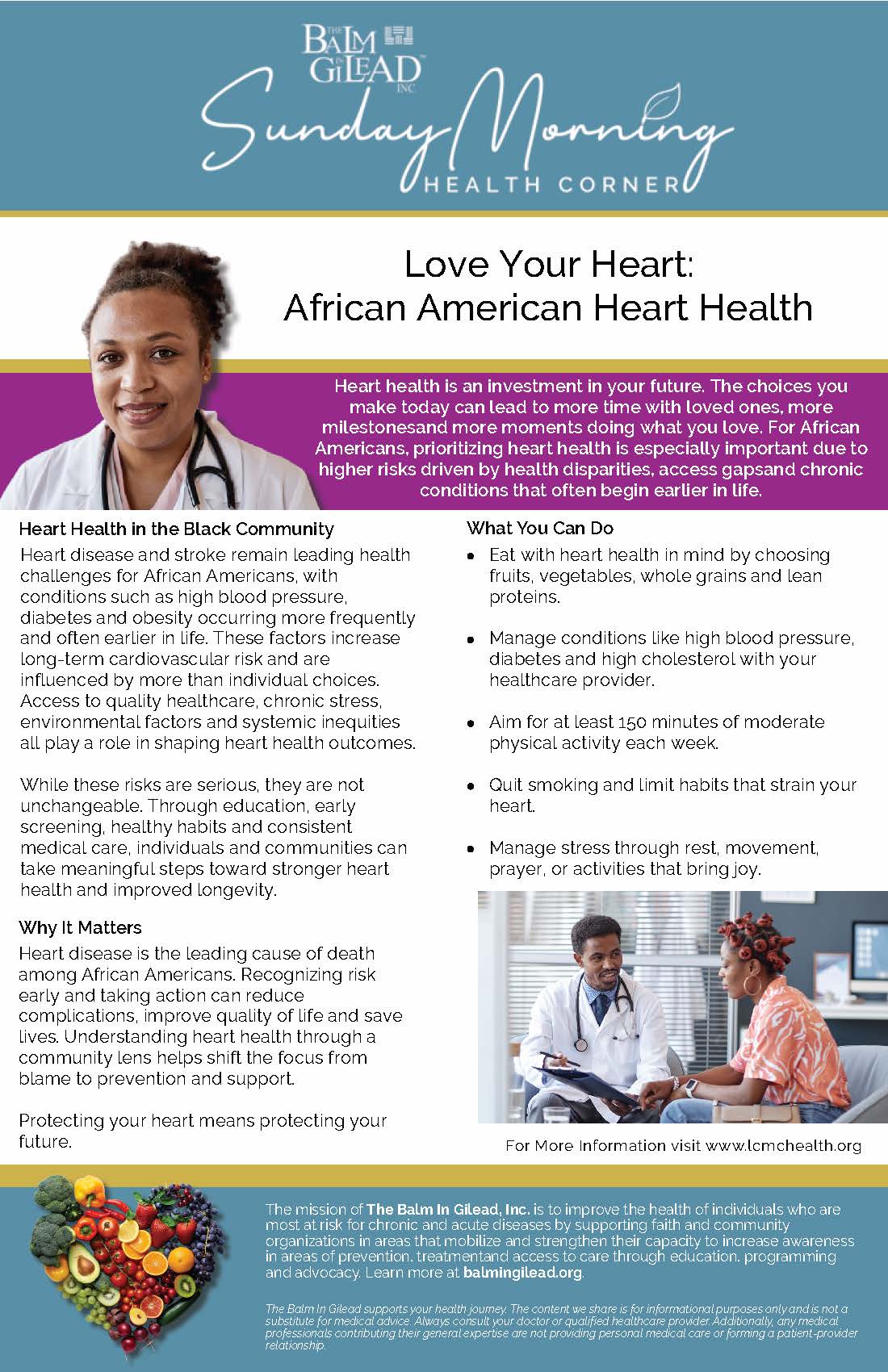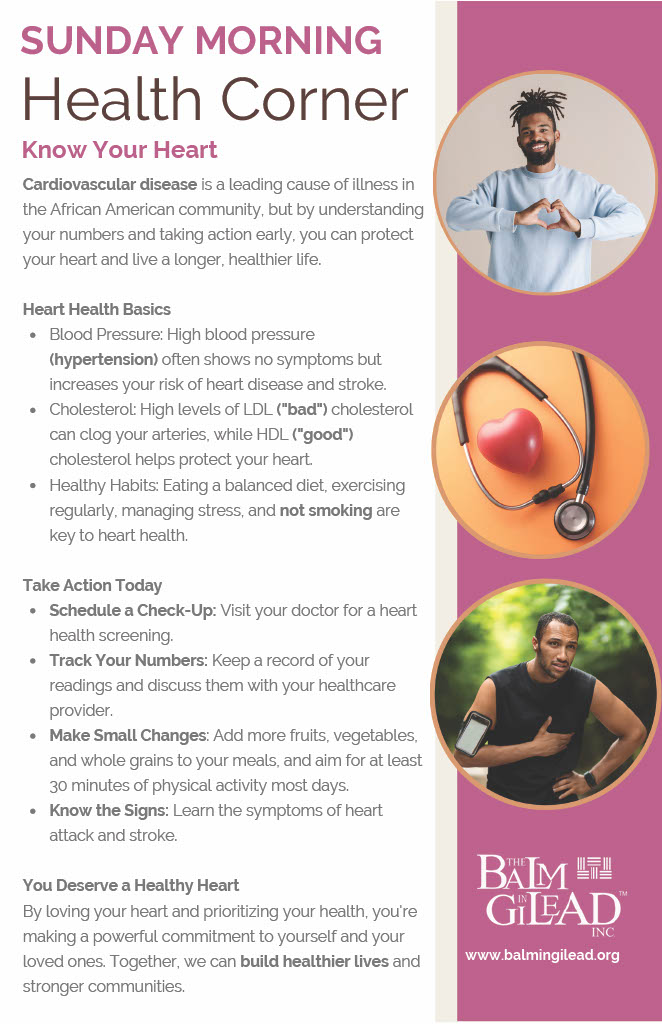Health Education Resources
- Details
- Category: Health Education Resources
Here’s your wake-up call: Daylight saving time may affect your heart health
As we prepare to “spring forward” on March 8th, the American Heart Association cites scientific research that indicates the springtime change may negatively impact your heart and brain health. While gaining extra daylight may be a nice change, the transition could come with some health challenges.
Losing an extra hour of sleep may not be the worst thing that could happen when you “spring forward” at the start of daylight-saving time. According to the American Heart Association’s researchers have noticed a marked increase in heart attacks and strokes in the days following this time change each year.
“We don’t really know exactly why there is an increase in heart attacks and strokes during the change to daylight saving time. It’s likely connected with the disruption to the body's internal clock, or its circadian rhythm,” said Maria Delgado-Lelievre, M.D., a distinguished Hypertension Specialist at the University of Miami Leonard M. Miller School of Medicine. “It’s important to be aware of this increased risk, especially if you already have heart disease or other risk factors.
The American Heart Association offers a few tips to get ahead of the time change:
- Do start now to get outside and get as much natural light as possible each day. This can help adjust your body rhythm for the change to come.
- Do begin winding down a little earlier in the evenings ahead. While you can never make up lost sleep, going into the time change well-rested can help.
- Don’t compensate with extra caffeine. It may feel like an extra coffee or two can help you through the midday slump, but too much caffeine is not good for your heart.
The Association’s recommended ideal level of sleep is:
- 7-9 hours daily for adults;
- 8-10 hours daily for ages 13-18 years;
- 9-12 hours daily for ages 6-12 years; and
- 10-16 hours daily for ages 5 and younger.
Making small changes in your daily habits can make a big difference in your sleep quality and overall health. Instead of turning on the TV to help you fall asleep, try reading a book or journaling about your day. Putting your phone in another room can also prevent the temptation to scroll in bed. Implementing these small habits now can help you prepare for the upcoming daylight-saving time change and ensure your sleep patterns are strong and more likely to remain consistent all year long.
Resource: https://www.heart.org/-/media/Healthy-Living-Files/Infographics/Sleep-Well--Infographic.pdf
Sources: heart.org and stroke.org
- Details
- Category: Health Education Resources
As we conclude the commemoration of the 100th Black History Month, we’re celebrating it by turning our intentions toward some of the trailblazing Black physicians, nurses, research scientists, and healthcare pioneers who not only advanced medical care throughout history but broke down barriers in the process.
And while these individuals and their legacies are part of a history that deserves amplification outside of just one calendar month a year, Black History Month offers an opportunity to pause and reflect on the immeasurable impact of these contributions in saving or improving so many lives.
So, please join us in celebrating the legacies of these Black healthcare pioneers (and take a few moments to learn more about their phenomenal lives and contribution to our health and history):
Historical Pioneers
- James McCune Smith (1813–1865): The first African American to earn a medical degree in the U.S., Smith established his own practice and pharmacy in New York City. He was a prominent abolitionist and contributed to medical literature, advocating for the rights of Black individuals.
- Rebecca Lee Crumpler (1831–1895): The first Black woman to receive an MD degree in the U.S., Crumpler focused on providing medical care to formerly enslaved individuals and authored one of the first medical publications by an African American.
- Daniel Hale Williams (1856–1931): Known for performing one of the first successful open-heart surgeries, Williams founded the first Black-owned interracial hospital in the U.S. and was a pioneer in surgical practices.
- Patricia Bath (1942–2019): An ophthalmologist who invented the laserphaco probe for cataract surgery, Bath was the first Black woman to receive a medical patent. She founded the American Institute for the Prevention of Blindness, advocating for eye health in underserved communities.
Contemporary Leaders
- Valerie Montgomery Rice, MD: As the first woman president of Morehouse School of Medicine, Montgomery Rice has significantly increased the number of MD candidates and focused on health disparities affecting women of color.
- David Satcher, MD, PhD: The first African American to lead the CDC, Satcher has been instrumental in addressing health disparities and promoting public health initiatives.
- Sandra Lindsay: Known for being the first person in the U.S. to receive the COVID-19 vaccine, Lindsay has been a strong advocate for health equity and vaccination in underserved communities.
- John Nkengasong, PhD: As the founding director of the Africa Centres for Disease Control and Prevention, Nkengasong has played a crucial role in public health responses in Africa, particularly during the COVID-19 pandemic.
These individuals represent just a fraction of the many African American doctors who have made significant impacts on healthcare, advocating for equity and advancing medical knowledge throughout history. Their legacies continue to inspire future generations in the medical field.
- Details
- Category: Health Education Resources
February is American Heart Month!
Did you know heart disease is the leading cause of death in the United States but impacts some communities disproportionately? Health problems that increase the risk of heart disease are common in African American communities, including high blood pressure, high cholesterol, diabetes, and being overweight. Having multiple risk factors increases the risk of heart disease. But the good news is that there’s a lot we can do to prevent it.
Did you know?
African American women 20 years and older: 81% are overweight, 58% have high blood pressure, 30% have high cholesterol, and 13% have been diagnosed with diabetes.
African American men 20 years and older: 72% are overweight, 57% have high blood pressure, 28% have high cholesterol, and 12% have been diagnosed with diabetes.
Help raise awareness about heart health among those you care about. Have conversations about heart health so they can better understand their risk factors for heart disease and take actionable steps to prevent or reduce them.
Lifestyle Tips
Here are some facts, how-to tips, and resources to inspire you and your community to work together to live a heart-healthy lifestyle.
- Be more physically active.
- Maintain a healthy weight.
- Eat a nutritious diet.
- Quit smoking.
- Reduce stress.
- Get 7-9 hours of quality sleep.
- Track your blood pressure, cholesterol, and blood sugar numbers.
You don’t have to make big changes all at once. Small steps will get you where you want to go.
For more information on keeping your heart healthy, join the Health Education Ministry on Saturday, February 14, 2026, at 10am and Sunday, February 15, 2026, immediately following service.
Sources: American Heart Association, Kaiser Permanente, National Center for Health Statistics



